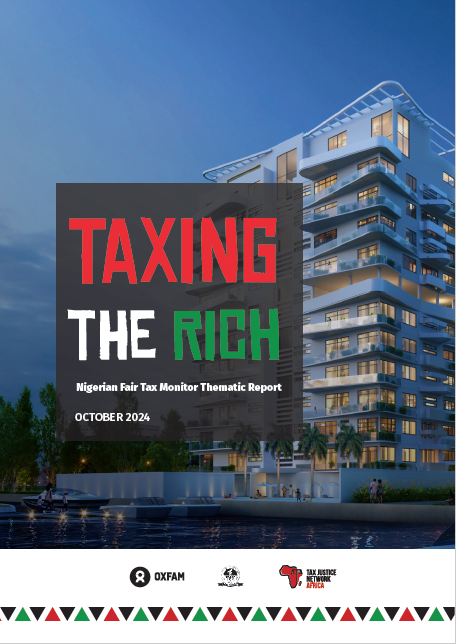
Front cover of the new FTM Nigeria report entitled “Taxing the Rich”
On 15th October 2024, the newest Fair Tax Monitor (FTM) report, thematically focused on Taxing the Rich, was launched in Nigeria. It shines a light on a critical issue: how fair taxation of the wealthiest could be the key to tackling the country’s deepening hunger and inequality crisis. Nigeria, one of Africa’s largest economies, faces an enormous challenge—while millions struggle with food insecurity, the richest 1% hold more wealth than the poorest half of the population. The FTM report shows that taxing the wealthy more effectively isn’t just fair—it’s essential for sustainable development and reducing inequality and hunger.
Nigeria’s Wealth Gap: An Alarming Disparity
Nigeria’s inequality problem is staggering. The top 1% of Nigerians own more than 25% of the nation’s wealth, while the bottom 50% control just 4.7%. To put this into perspective, a person in the top 1% is 271 times wealthier than someone in the bottom half. Meanwhile, over 63% of the population live in multidimensional poverty, with millions going hungry every day.
Yet, despite their vast wealth, Nigeria’s richest contribute disproportionately little in taxes. The FTM report found that less than 0.04% of high-net-worth individuals are compliant taxpayers. That’s right—over 99% of the wealthiest Nigerians are either avoiding or evading their taxes. This is a major loss of revenue that could be used to fund essential services like healthcare, education, and food programs.
The Power of Progressive Taxation
One of the most significant findings in the report is the immense potential of a progressive wealth tax. By introducing a modest tax on the wealth of Nigeria’s richest, the country could raise over $6 billion a year. That’s enough to more than double the government’s health budget or cut household healthcare costs by 40%.
What does this mean for ordinary Nigerians? A fair tax system that ensures the rich contribute their share would allow the government to invest in programs that directly tackle hunger, poverty, and inequality. From improving food security to funding education and healthcare, the benefits would be felt across the country.
Why Now is the Time to Act
Nigeria is at a turning point. The government has taken steps to expand its tax base and increase transparency, but current policies—such as VAT increases—have hit low-income families the hardest. The FTM report argues that it’s time for a shift in focus. Instead of relying on regressive taxes that worsen inequality, Nigeria should turn its attention to those who can afford to contribute more—the wealthy.
Taxing the rich isn’t just about raising revenue. It’s about redistributing resources more equitably and addressing the root causes of poverty and hunger. With millions of Nigerians living in extreme poverty, it’s time for the country to adopt fairer, more progressive tax policies.
Key Recommendations
The FTM report highlights several key steps Nigeria can take to create a more just and effective tax system:
- Introduce a progressive wealth tax: Taxing individuals with a net wealth above $1 million could raise billions in revenue, helping fund anti-poverty programs and social services.
- Reform property taxes: Strengthening property tax laws will ensure those who own high-value properties pay their fair share, with the revenue going toward local development projects.
- Improve tax compliance: Establishing a dedicated unit within the Federal Inland Revenue Service (FIRS) to oversee the taxation of high-net-worth individuals would ensure better compliance and generate significant revenue.
A Fairer Future for Nigeria
At the heart of this report is a simple idea: fairness. Nigeria’s wealthiest citizens must contribute their share if the country is to address its hunger and inequality crisis. By implementing progressive tax reforms, Nigeria has the opportunity to lift millions out of poverty, reduce food insecurity, and create a more just society for all.
The launch of this FTM report is a call to action—for policymakers, civil society, and citizens alike. We have the tools to create a fairer tax system that works for everyone, not just the privileged few. It’s time to make tax fair, and in doing so, build a future where no one in Nigeria goes hungry.
For more details, download the full report here.
